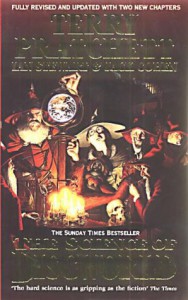Review: The Science of Discworld (Discworld Book 28 of 53ish)

The Science of Discworld is an odd sort of Discworld book. Based on the name, I had thought it was going to delve into more detail about the fictional workings of the Discworld. Like, say, how the giant turtle and the elephants stay alive outside of an atmosphere or how water on the Discworld gets replenished when it keeps falling off the disc… If that last sentence makes it sound like I’ve gone off the deep end, then you clearly haven’t tried reading Discworld.
The science in this book is actually more about the real science of our own world, with a very thin Discworld story interspersed between the science bits. The Discworld part of the story takes place in the Unseen University, where the wizards end up creating a simulation of the birth of a universe remarkably like ours, followed by many million years’ worth of evolution on “roundworld”, a planet that is also remarkably like ours. Each short Discworld-based chapter is then followed up with a science chapter discussing topics related to what’s going on in the Discworld story.
For the first 25% of this book, I wasn’t sure I was going to make it through to the end. The science parts were boring me to tears because they mostly covered either terribly basic concepts or entirely theoretical topics that I wasn’t very interested in reading about. As it went on, it got more interesting, although there were still scattered bits of boredom here and there. If this had been a book about computer science, I probably would have enjoyed the theoretical parts equally as well as the practical parts. Actually, even though it wasn’t at all the focus of the story, computer science did get a few mentions here and there, and I particularly enjoyed those parts. When it comes to the natural sciences, however, my interest isn’t strong enough to sustain me through theory. I enjoyed it when the authors discussed what we do know and why we think we know it, whereas the various speculations about things we have no way of knowing for sure were more frustrating to me than interesting.
The Discworld part of the story was very short, but amusing. It served as a nice way to break up the science bits and provide some humor. However, the story had a major logical flaw that annoyed me to no end:
(show spoiler)
So… will I read the second science book? Yes, I think so, once I get to that point in the publication order. Whether or not I read the last two will probably depend on my reaction to the second one.
 2
2
 7
7


